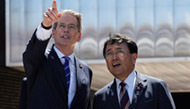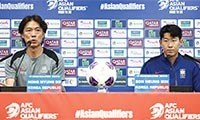Drama Elicits Mixed Emotions in L.A.
▶ Southland: Talk of a reunified peninsula raises hope among many Korean Americans, others view meetings with skepticism.
“For all these years, we have been praying and waiting for a free, united Korea,” said Oh, who hasn’t seen his native north since he left in 1946. “Now the two top leaders are talking about it in person. That’s encouraging.”
As Oh and his wife, Hyang-rim, 74, watched the coverage of the historic summit of the South’s Kim Dae-jung and the North’s Kim Jong-il on the local Korean-language television station, he was struck by the irony of it all, he said.
“Kim Il-sung [Kim Jong-il’s father] force me to leave my home, and now his son could be letting me back in,” he said. “It’s like a dream.”
Since the two Kims agreed to meet, Korean churches throughout Southern California, which has the largest population of people of Korean ancestry outside Asia, have held countless prayer meetings, attended by tens of thousands.
After half a century of enmity between the two governments— including a fratricidal war and years of talk about reunification but little action—many Korean Americans understandably are skeptical.
“Can 50 years of indoctrination change in one day just because the two leaders shook hands and people saw it on television?” asked Kee-whan Ha, president of the Korean American Federation of Los Angeles.
Ha said he believes that much of what happened this week (of June 12) at the meeting in the North Korean capital, Pyongyang—including hundreds of thousands of people lining the streets to greet Kim Dae-jung—was for show.
“They put on their best clothes and showed up because they were ordered to,” he said.
Regardless, the meeting of the two leaders in itself is an epochal achievement, said Jimmy Choi, chairman of the Los Angeles-based Korean Resource Center.
Choi, a Quaker who has visited North Korea three times since 1981—most recently last year—said he has never been more optimistic about the future of the Korean peninsula.
“I am very excited,” he said. “I know that many Koreans are suspicious—they’re wondering whether Kim Jong-il is putting on an act—but I simply want to trust this time. After all, this is the first time the [two countries’] leaders at the highest level have met.”
What he has noticed during his visits is that North Korean society is a bit more open than before, he said.
He said he was pleasantly surprised that Kim Jong-il came across as much more human than expected. For years, the reclusive North Korean leader, who inherited power after his father’s death in July 1994, has been portrayed in the South Korean press as a dangerous eccentric, allegedly responsible for ordering such atrocities as the 1989 killing of South Korean officials visiting Burma, now known as Myanmar.
During their talks, the two leaders promised to allow exchanges of separated relatives around Aug. 15, the 55th anniversary of Korea’s liberation from Japan.
Choi said he hopes that Aug. 15 will mark the start of mass visits for separated families.
An estimated 11 million Koreans were separated by the partitioning, imposed after Japan’s surrender in World War II. What was to have been liberation for Korea turned into a divided country, the North under the influence of the Soviet Union and the South under the United States’ wing.
Inbo Sim, 36, a Korean American activist, said he was disappointed that the two Kims didn’t discuss the issue of security. (The South’s Kim, after returning to Seoul, revealed that the two leaders had indeed discussed such issues.)
“Concrete steps to ensure military stability on the peninsula is necessary,” Sim said. “Koreans didn’t divide their country.” Similarly, reunification of the peninsula also will involve the United States, Japan, China and other powers, he said.
Sim said he doesn’t want Korea to be a pawn of power struggles between superpowers.
Joon-bok Kim, 79, who left Pyongyang in 1946 for the South, said it’s too early to judge.
“This is a good development, but we have to wait and see what follows,” he said.
“When you are joyous, you want your joy to be full and complete,” said the Rev. Hyun-seung Yang of Shalom Mission near Koreatown. “But in this case, the joy is mixed because we feel that we need to proceed cautiously; we need sang-froid.”
Yang, who as a delegate of the Los Angeles-based Korean American Sharing Movement took grain to North Korea in 1997, said it is important to remember that what is happening between the two leaders is not solely their doing.
“What has come to pass,” Yang said, “is the result of blood, sweat, tears—and prayers—of countless Koreans everywhere.”
스마터리빙
more [ 건강]
[ 건강]이제 혈관 건강도 챙기자!
[현대해운]우리 눈에 보이지 않기 때문에 혈관 건강을 챙기는 것은 결코 쉽지 않은데요. 여러분은 혈관 건강을 유지하기 위해 어떤 노력을 하시나요?
 [ 건강]
[ 건강]내 몸이 건강해지는 과일궁합
 [ 라이프]
[ 라이프]벌레야 물럿거라! 천연 해충제 만들기
 [ 건강]
[ 건강]혈압 낮추는데 좋은 식품
[현대해운]혈관 건강은 주로 노화가 진행되면서 지켜야 할 문제라고 인식되어 왔습니다. 최근 생활 패턴과 식생활의 변화로 혈관의 노화 진행이 빨라지고
사람·사람들
more
“취미생활로 다진 친목… 선후배들과 만든 모교사랑”
사진러브한인 사진 동호회 사진러브(회장 크리스 고)는 13일 용수산에서 송년모임을 갖고 한 해를 마무리하는 뜻깊은 시간을 가졌다. 이날 모임에…

[홀인원] 이상원 박사
일반외과 전문의 이상원(왼쪽) 박사가 지난 9일 뉴포트비치 소재 골프장 9번 홀(152야드)에서 레스큐 클럽으로 친 샷이 그대로 홀에 빨려 들…
[송년행사 게시판] 재미시인협회
재미시인협회(회장 지성심)는 오는 20일 오후 4시 가든스윗호텔에서 한 해를 마무리하며 동인지 ‘외지’ 제35집 출판 기념회와 ‘제23회 재미…
[송년행사 게시판] 향군단체 연합
6.25 참전유공자회와 대한민국 육군협회 등 남가주 지역 향군 단체 연합은 19일 오전 11시30분, 용궁에서 송년 행사를 개최한다. 드레스코…
[송년행사 화보] “이웃과 함께 나누고 지인과 함…
KYCC13일 윌튼 플레이스 초등학교에서 열린 ‘한인타운청소년회관(KYCC) 홀리데이 카니발’이 성황리에 막을 내렸다. 올해는 KYCC 창립 …
많이 본 기사
- “1인당 2,000달러 환급금·세금 부담 역대 최저”
- ‘반이민 가속페달’⋯ 시민권자도 대거 추방
- ‘수퍼 독감’ 확산… 확진 4배 급증
- 캐롤라이나 항공기 추락 조종사·일가족 7명 사망
- 트럼프 행정부, 대마초 규제 완화
- ‘뇌종양 투병’ 윤석화, 끝내 별세..향년 69세
- 한인 부인 살해 혐의 남편 법정 출두 무죄 주장
- 시신 훔쳐 팔아넘긴 부부 징역 중형
- 베네수엘라, 해군에 “유조선 호위하라”
- 구리 절도 기승⋯ 가로등 ‘깜깜’
- ‘소셜번호 정지’메일 기승
- 전현무, 차량 링거 결국 입 열었다.. “의사 진료 처방..불법 NO”
- “연대의 빛으로 증오 극복”
- 박수홍 친형, 2심서 징역 3년 6개월 법정구속..형수 오열
- “첼시 판 돈 우크라에 쓰라” 영국, 러 재벌에 최후 통첩
- 천정궁엔 언제? 시계는 어디에?…전재수 불렀지만 첩첩산중
- 한인 다큐 감독 크리스틴 최 별세
- 한인 헤지펀드 거물, CNN 인수 추진
- [금요단상] AI와 동거, 그 실체
- 거주·투자용 한국 부동산 인기… 한인 유치 ‘치열’
- 허위광고 등 ‘연말 사기 주의보’
- [커뮤니티 게시판] 한인직업교육센터, 새학기 수강신청 접수
- “취미생활로 다진 친목… 선후배들과 만든 모교사랑”
- 한국연극배우협회 “윤석화 별세 사실 아냐”…보도자료 정정·사과
- 오스카 시상식, 2029년부터 유튜브 생중계
- 월드컵 입장권 폭등 비판 FIFA, ‘60달러’ 티켓 발매
- 연말이 되면 사라지는 선택들
- ‘재무장 선언’ 독일, 군장비 대거 구매
- 음문석, ‘모범택시3’로 보여준 새로운 얼굴
- 잇단 총격·테러 음모… 한인타운 안전 우려
- 엔비디아·구글·오픈AI 등 빅테크들, 美 ‘제네시스 미션’ 합류
- 존 이 시의원 13만불 벌금 LA윤리위원회 최종 판결
- 2025년, 성찰과 감사의 마무리를
- 홍명보호, 최소 1,050만 달러… 8강 진출 시 2,050만 달러‘잭팟’
- ‘주사이모’ 의혹에 입짧은햇님도 활동 중단… “의사라고 믿었다”
- 인텔 준국유화·US스틸 황금주… 트럼프, 산업·금융 쥐락펴락
- 한인 학생들, 로즈데일 애국지사 묘역 꾸미기 행사
- 워싱턴 일원 소비 확 줄어들었다
- “보이스피싱 이렇게 당한다”
- 40·50대 은퇴, 자산은 있는데 확신은 없다
- 리 장군 동상 철거한 자리에 흑인 소… 2
- “왜 한국 자산 미국으로 옮겨야 하나… 1
- 내년 금리인하 전망… 연준 1회, 시장은 2회
- [화제] 베조스 전 부인… ‘기부의 여왕’ 변신
- [만화경] 웰다잉 인센티브
- 브라운대 총격 용의자 특정…MIT 교수 살해 연관성도 수사
- “판공비 1만달러 전액 반환하겠다” 4
- ‘브라운대 총기참사’ 뉴욕 한인학생도 총상
- 반세기 붓길을 돌아보다⋯남강 김선희 작가 서예전
- 한국타이어, 테네시공장 증설… 생산 두배로
1/5지식톡

-
 ☝️해외에서도 가능한 한국어 선생님…
0
☝️해외에서도 가능한 한국어 선생님…
0이 영상 하나면 충분합니다!♥️상담신청문의♥️☝️ 문의 폭주로 '선착순 상담'만 진행합니다.☎️ : 02-6213-9094✨카카오톡ID : @GOODEDU77 (@골뱅이 꼭 붙여주셔야합니다…
-
 테슬라 자동차 시트커버 장착
0
테슬라 자동차 시트커버 장착
0테슬라 시트커버, 사놓고 아직 못 씌우셨죠?장착이 생각보다 쉽지 않습니다.20년 경력 전문가에게 맡기세요 — 깔끔하고 딱 맞게 장착해드립니다!장착비용:앞좌석: $40뒷좌석: $60앞·뒷좌석 …
-
 식당용 부탄가스
0
식당용 부탄가스
0식당용 부탄가스 홀세일 합니다 로스앤젤레스 다운타운 픽업 가능 안녕 하세요?강아지 & 고양이 모든 애완동물 / 반려동물 식품 & 모든 애완동물/반려동물 관련 제품들 전문적으로 홀세일/취급하는 회사 입니다 100% …
-
 ACSL 국제 컴퓨터 과학 대회, …
0
ACSL 국제 컴퓨터 과학 대회, …
0웹사이트 : www.eduspot.co.kr 카카오톡 상담하기 : https://pf.kakao.com/_BEQWxb블로그 : https://blog.naver.com/eduspotmain안녕하세요, 에듀스팟입니다…
-
 바디프렌드 안마의자 창고 리퍼브 세…
0
바디프렌드 안마의자 창고 리퍼브 세…
0거의 새제품급 리퍼브 안마의자 대방출 한다고 합니다!8월 23일(토)…24일(일) 단 이틀!특가 판매가Famille: $500 ~ $1,000Falcon: $1,500 ~ $2,500픽업 & 배송직접 픽업 가능LA…
케이타운 1번가
오피니언
 한영일 / 서울경제 논설위원
한영일 / 서울경제 논설위원[만화경] 웰다잉 인센티브
 캐슬린 파커 워싱턴포스트 칼럼니스트
캐슬린 파커 워싱턴포스트 칼럼니스트 [캐슬린 파커 칼럼] 아이들을 온라인에서 보호하기
 양상훈 수필가ㆍ시인
양상훈 수필가ㆍ시인 [한국춘추] 경제대공황ㆍ제2차 세계대전 승리로 극복한 루스벨트 리더쉽

[왈가 왈부] 고환율에 외환 건전성 완화·서학개미 규제… 미봉책 아닌가요
 수잔 최 한미가정상담소 이사장 가정법 전문 변호사
수잔 최 한미가정상담소 이사장 가정법 전문 변호사 [수잔 최 변호사의 LIFE &] AI 시대 편리함에 안주하지 말자
 김도년 성균관대 건축학과 교수 스마트도시·건축학회장
김도년 성균관대 건축학과 교수 스마트도시·건축학회장 [로터리] 지멘스가 만드는 미래 동네
1/3지사별 뉴스

‘브라운대 총기참사’ 뉴욕 한인학생도 총상
▶총상 입은 상황서도 동료학생 의식 잃지않도록 도와 ▶부친도 동문 “우리 가족에게 고통스러운 일”지난 13일 발생한 브라운대학교 총기난사(본보…
뉴욕주 안락사 합법화 초읽기 호쿨, “안전장치 마련되면 서명”

워싱턴 일원 소비 확 줄어들었다
올해 8월 워싱턴DC에 범죄와의 전쟁을 명분으로 주방위군이 본격적으로 배치된 가운데, 이 시기 이후부터 버지니아와 메릴랜드, DC 등 워싱턴 …
“북VA 주택시장 가격 급등 없다”

베이지역 스포츠팀, SF 한인회에 후원금
샌프란시스코 베이지역 한인회(회장 김한일)는 한인 메이저리거 이정후 선수의 소속팀인 샌프란시스코 자이언츠(San Francisco Giants…
불자커뮤니티 20일 청소년발표회및 송년회

오늘 하루 이 창 열지 않음 닫기 




















































.png)


댓글 안에 당신의 성숙함도 담아 주세요.
'오늘의 한마디'는 기사에 대하여 자신의 생각을 말하고 남의 생각을 들으며 서로 다양한 의견을 나누는 공간입니다. 그러나 간혹 불건전한 내용을 올리시는 분들이 계셔서 건전한 인터넷문화 정착을 위해 아래와 같은 운영원칙을 적용합니다.
자체 모니터링을 통해 아래에 해당하는 내용이 포함된 댓글이 발견되면 예고없이 삭제 조치를 하겠습니다.
불건전한 댓글을 올리거나, 이름에 비속어 및 상대방의 불쾌감을 주는 단어를 사용, 유명인 또는 특정 일반인을 사칭하는 경우 이용에 대한 차단 제재를 받을 수 있습니다. 차단될 경우, 일주일간 댓글을 달수 없게 됩니다.
명예훼손, 개인정보 유출, 욕설 등 법률에 위반되는 댓글은 관계 법령에 의거 민형사상 처벌을 받을 수 있으니 이용에 주의를 부탁드립니다.
Close
x